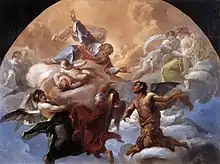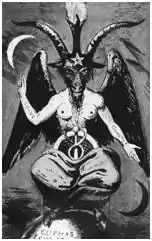Satan
Ha-Satan (meaning "the enemy" or "the trouble-maker" in Hebrew), sometimes called the Devil, is a figure found in the writings of the Abrahamic religions. Muslims, Christians and Jews believe that he tempts people to do bad things. His role is to question and tempt people's faith. Christians also say that he was once an angel named Lucifer. Some Muslims on the other hand believe, he was once an angel called Azazel.

In Satanism, Satan is thought to be just a metaphor for what humans want. In Theistic Satanism, Satan is considered to be a good force.
Book of Enoch
The Book of Enoch, is not part of the Bible, but seems to have been popular among many early Christians and Jews during the life-time of Jesus. The fallen angels according to this book did not try to become equal to God, but wanted to live among humans. They revealed the secrets of heaven, which leads people to war and sin. Satan, however, is not one of the fallen angels in this Book, but punishes the fallen angels (and wicked humans) for their sins.[1]
This might be the reason why many Christians think that Satan will also punish the sinners in hell, even if this book is not part of the Bible. Not in the Quran either, but known in Muslim legends, Satan is said to have been sent by God (Allah) to punish the djinns.
Christianity
In the Bible, which consists of both Hebrew scriptures from Judaism (Old Testament) and the New Testament about Jesus and his followers, Satan is often mentioned. In the Old Testament, there is the Book of Job, in which Satan makes a bet with God, whether he can make Job turn against God or not. In the New Testament, he is the main opponent of Jesus.
According to Christianity, Satan tried to become God himself, and was banished from heaven for his attempt. This derives from parts of the Bible, in which a star is said to try to make himself equal to God. This star is called Lucifer and interpreted as Satan. Some Christians make a distinction between Satan and Lucifer. In this case, Satan is Lucifers' general. Satan would serve Lucifer on earth, because Lucifer is chained in the underworld.
In the Bible
- In the Hebrew Bible (also called the Old Testament in Christianity), Satan is responsible for several acts opposed to God's way; these are some examples:
- In the New Testament:
- Jesus was led into the desert by the Holy Spirit to fast, and to be tested by the devil. Satan tempted Jesus three times. Jesus stood against him by using the Scriptures.[6]
- Revelation tells of a final battle between God and Satan, with God winning over the powers of evil[7]
Many people believe that Satan was first an angel called Lucifer that left Heaven and took many other angels with him. He did this because he thought he was as powerful as God.[8]
In the Quran
In Islam, a shayṭān is any sort of evil creature. The person, Christians call Satan, is named Iblis. The Qu'ran describes Satan as arrogant. The story about him begins in surah Baqarah. It states that Satan views himself as a greater entity than God's other creations because he was created from fire. After this, the Qu'ran states:
- (Allah) said: "What prevented thee from prostrating when I commanded thee?" He said: "I am better than he: Thou didst create me from fire, and him from clay.
In the Bahá'í Faith
In the Bahá'í Faith, Satan is not regarded as an independent evil power as he is in some faiths and religions, but rather signifies the lower nature of humans. `Abdu'l-Bahá explains: "This lower nature in man is symbolized as Satan — the evil ego within us, not an evil personality outside." All other evil spirits described in various faith traditions—such as fallen angels, demons, and jinns—are also metaphors for the base character traits a human being may acquire and manifest when he turns away from God. Actions, that are described as "satanic" in some Bahá'í writings, denote humans deeds caused by selfish desires.
References
- Caldwell, William (1913). "The Doctrine of Satan: II. Satan in Extra-Biblical Apocalyptical Literature". The Biblical World. pp. 98–102.
- Genesis 3:1–8
- Job 1
- 1 Chronicles 21:1–8
- Zechariah 3:1–2
- Matthew 4:1–11
- Revelation 20
- Isaiah 14:12–15
